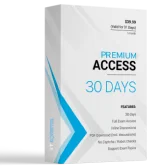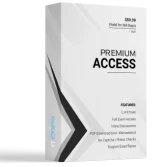Want to Unlock Features That Will Help You Study for MCPA - Level 1?
By buying Premium Access for yourself, you will gain the following features:

-
 31 days access 2.26 / day
31 days access 2.26 / day
-
 All Questions for 1 Exam
All Questions for 1 Exam
-
 Real Questions, Detailed Answers
Real Questions, Detailed Answers
-
 No Captcha / Robot Checks
No Captcha / Robot Checks
-
 Includes Exam Updates
Includes Exam Updates

-
 3 Months Access
3 Months Access
-
 All Questions for 1 Exam
All Questions for 1 Exam
-
 Real Questions, Detailed Answers
Real Questions, Detailed Answers
-
 No Captcha / Robot Checks
No Captcha / Robot Checks
-
 Includes Exam Updates
Includes Exam Updates